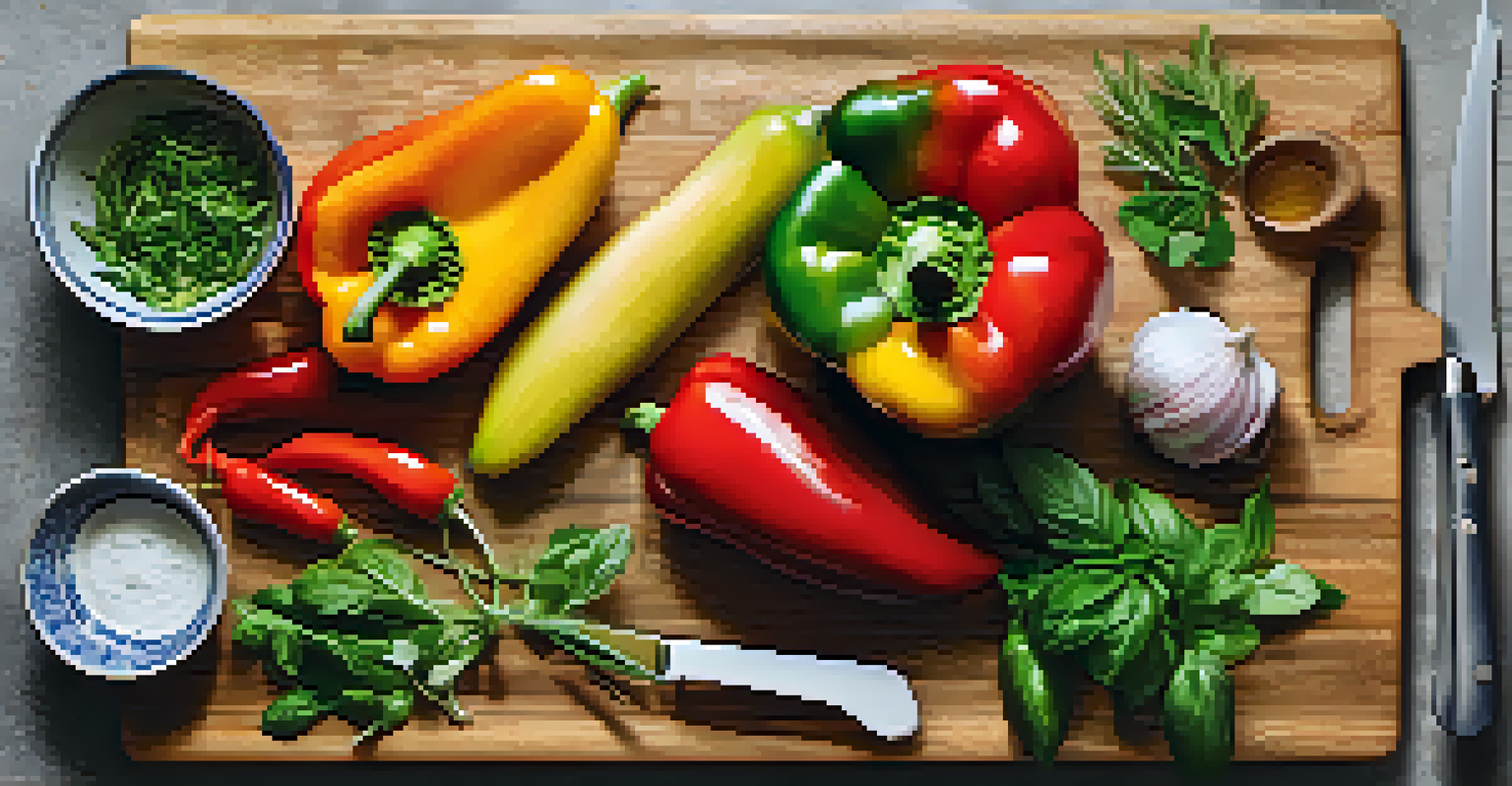Exploring the Role of Cooking in Weight Loss Programs

Understanding the Link Between Cooking and Weight Loss
Cooking at home plays a crucial role in weight loss programs. By preparing your own meals, you have full control over ingredients and portion sizes. This allows you to make healthier choices that can significantly impact your weight loss journey.
Cooking is like love. It should be entered into with abandon or not at all.
Moreover, cooking encourages mindfulness about what you're eating. When you take the time to prepare a meal, you tend to appreciate your food more and are less likely to overeat. This mindful approach can prevent the mindless snacking that often derails diet plans.
Incorporating cooking into your routine not only aids in weight loss but also fosters a deeper understanding of nutrition. As you learn to cook, you become more aware of how different foods affect your body, making it easier to make better choices.
Benefits of Meal Prep for Weight Loss Success
Meal prepping is a game-changer for anyone on a weight loss program. By planning and preparing your meals in advance, you eliminate the temptation to grab unhealthy options when you're in a rush. This proactive approach helps you stick to your goals.

Additionally, meal prep saves time and reduces stress during busy weekdays. Imagine opening your fridge to find healthy meals ready to go, making it easier to choose nutritious options. This convenience can significantly increase your chances of staying on track.
Cooking Enhances Weight Loss Control
Preparing meals at home gives you control over ingredients and portion sizes, supporting healthier choices.
Furthermore, prepping meals allows you to experiment with new recipes and ingredients. This not only keeps your meals interesting but also encourages a varied diet, which is essential for long-term weight loss and health.
Healthy Cooking Techniques for Weight Loss
The way you cook your food can greatly influence its healthiness. Techniques like steaming, baking, and grilling can help retain the nutritional value of your ingredients while reducing calories from added fats. For example, grilling vegetables can enhance their flavor without the need for extra oil.
Let food be thy medicine and medicine be thy food.
On the other hand, frying or using heavy sauces can add unnecessary calories, which might hinder your weight loss efforts. By focusing on healthier cooking methods, you can enjoy delicious meals without compromising your goals.
Learning to incorporate herbs and spices instead of high-calorie sauces is another way to enhance flavor while keeping meals light. This not only supports weight loss but also expands your culinary skills, making cooking more enjoyable.
The Importance of Portion Control in Cooking
Portion control is a vital aspect of any weight loss program, and cooking at home allows you to manage this effectively. By measuring ingredients and serving sizes, you can better adhere to recommended portions, which can help prevent overeating.
Using smaller plates or bowls when serving meals can trick your brain into feeling satisfied with less food. This simple change can make a significant difference in your overall calorie intake without feeling deprived.
Meal Prep Reduces Weight Loss Stress
Planning and prepping meals in advance eliminates the temptation of unhealthy options, making it easier to stay on track.
Additionally, understanding portion sizes can help you make more informed choices when dining out. Knowing what constitutes a healthy portion makes it easier to navigate restaurant menus and enjoy meals without guilt.
Cooking as a Family Activity to Support Weight Loss
Involving your family in cooking can turn meal preparation into a fun and engaging activity. Not only does this strengthen family bonds, but it also promotes healthy eating habits among all members. Kids who help in the kitchen are more likely to try new foods and develop a positive relationship with nutritious meals.
Cooking together also creates an opportunity to educate family members about nutrition. Discussing the benefits of various ingredients can inspire everyone to make healthier choices, making weight loss a shared goal.
Moreover, preparing meals as a family can encourage accountability. When everyone participates, there’s a collective commitment to maintaining healthier eating habits, which can lead to more successful weight loss outcomes.
Overcoming Cooking Challenges in Weight Loss Programs
Many people face challenges when it comes to cooking for weight loss, such as time constraints or lack of skills. However, addressing these obstacles can make a significant difference in your journey. For instance, dedicating just a couple of hours on the weekend for meal prep can save you time during the week.
If you're unsure where to start, consider simple recipes that require minimal ingredients and steps. As you gain confidence, you can gradually try more complex dishes. There are endless resources available online, from tutorial videos to recipe blogs, to help you build your skills.
Cooking Together Builds Healthy Habits
Involving family in cooking promotes healthy eating habits and fosters a supportive environment for weight loss.
Remember, cooking doesn't have to be perfect. It's about making progress, not achieving perfection. Embracing mistakes as learning experiences can keep you motivated and make the journey enjoyable.
The Psychological Benefits of Cooking for Weight Loss
Cooking can have profound psychological benefits that support weight loss efforts. Engaging in the kitchen can be a stress-reliever, providing a sense of accomplishment and creativity. This mental boost can enhance overall well-being and make it easier to stick to your weight loss goals.
Moreover, the act of cooking can foster a sense of control over your diet. When you create your meals, you’re empowered to make choices that align with your health objectives. This feeling of control can reduce anxiety around food and promote healthier eating habits.

Lastly, sharing meals with others can enhance your social connections, which are essential for emotional health. Enjoying a homemade meal with friends or family not only nourishes your body but also feeds your soul, making the weight loss journey more enjoyable.
Conclusion: Embracing Cooking for Sustainable Weight Loss
Incorporating cooking into your weight loss program is not just about nutrition; it’s a holistic approach to health. From meal prepping to mastering healthy cooking techniques, every step you take in the kitchen can contribute to your overall success. Embracing this journey can lead to lasting changes in both your weight and your relationship with food.
As you explore the world of cooking, remember to be patient with yourself. Building new habits takes time, but the rewards are worth it. Each healthy meal you prepare is a step closer to your goals and a celebration of your progress.
Ultimately, cooking is about more than just food. It's about nurturing yourself and discovering the joy in creating meals that support your health and well-being. So, roll up your sleeves and enjoy the journey!